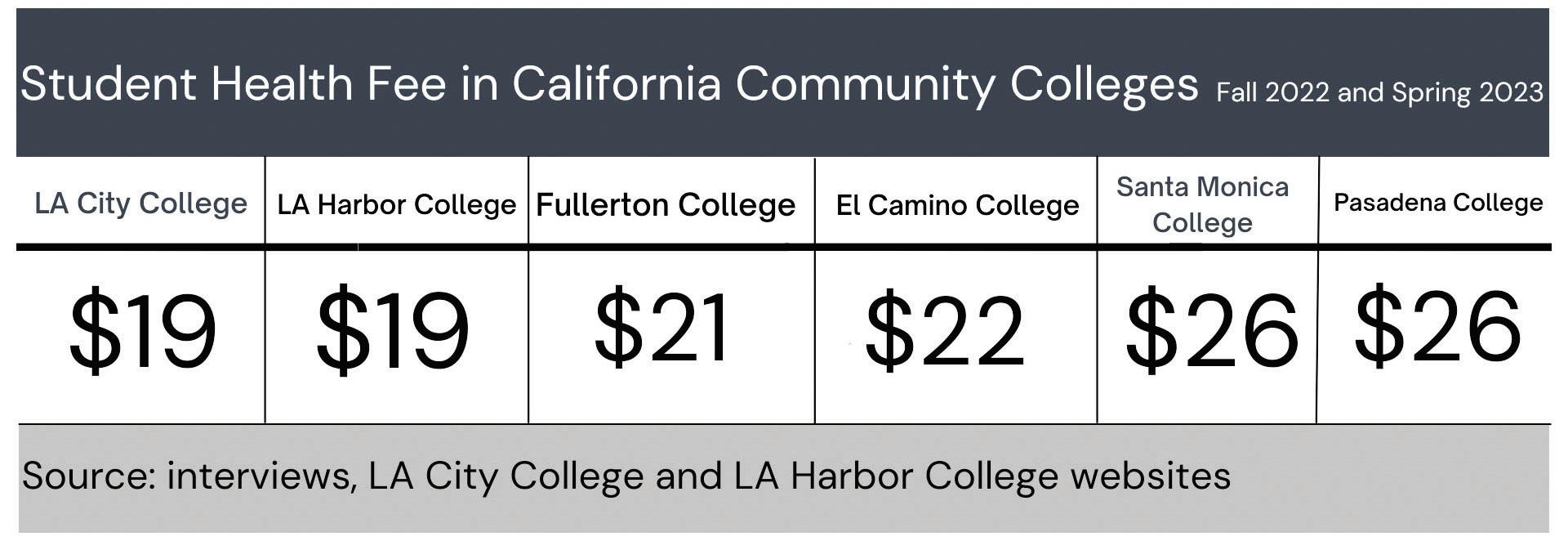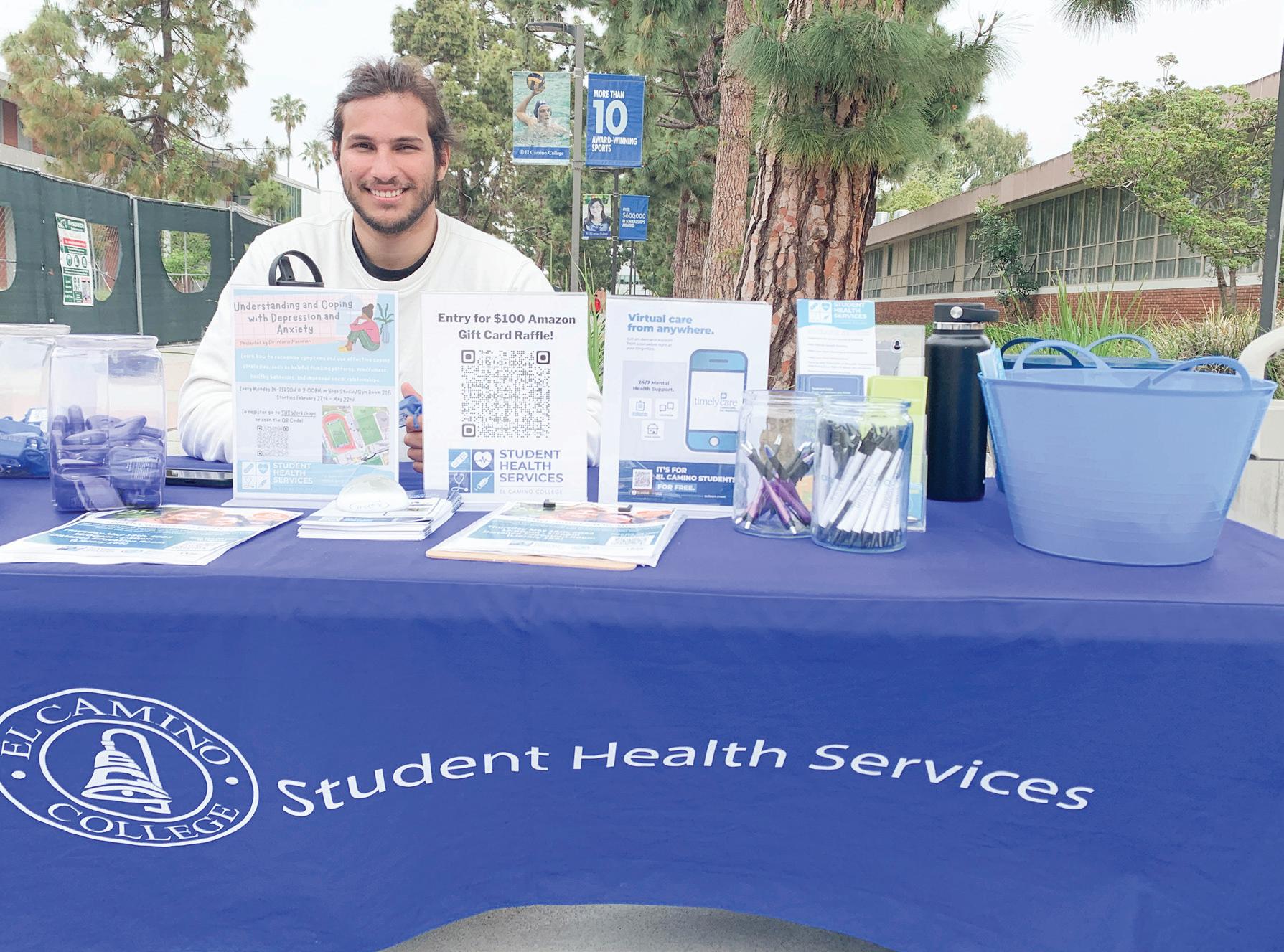
4 minute read
Colleges taking action on mental health
Campuses offers individual and group therapy, support workshops and online resources
By Igor Colonno
Advertisement
California community colleges are taking action by spending more money to bring additional mental health resources.
The state of California has increased its funding for community college for the 2021-2022 academic year by funding $30 million from the state’s general fund, according to the California’s Legislature Nonpartisan Fiscal and Policy Advisor.
The state of California has appropriated the funding for regional trainings, Crisis Text line support, mental health resource materials, and Kognito online suicide prevention training In 2021, 106 community colleges were currently enrolled in these services, according to a Mental Health & Health Services Overview. Colleges are also funded by their mandatory student health fee. This enables colleges to provide extra help to students, including counseling sessions, therapy, group therapy and more.
The student health fee at El Camino College is $22 each fall and spring semester.
Health fees at other colleges cost $19, a 15.8% decrease compared to $22, and lower than the maximum fee limited to $26, an 18% increase.
The center offers individual assistance, but its long waitlist averages 10 days, according to Susan Nilles, director of the Student Health Center.
To solve this issue, Nilles said the center is working to bring the platform Togetherall to El Camino College.
The platform is a peer-to-peer online mental health community featuring 24/7 clinical moderation, courses and resources for students.
Nilles said the Student Health Center will offer a program to post-doctoral students to work with professionals.
Currently El Camino provides TimelyCare, an external source to replace the slow pace, and get help as soon as possible.
The app provides scheduled appointments with a provider where students can choose psychologists by preference and offers the TalkNow service any time of the day. A licensed psychologist will be available within five minutes.
Even though the service is useful, Nilles said students still prefer in-person meetings with a psychologist.
The Student Health Center offers six visits per academic year, and depending on the problem, a person may be referred to an outside specialist for further assistance.
Lux Vargas, a 21-year-old fashion designer major said she recommends using the therapy counseling sessions available at El Camino.
“I have anxiety so they helped me utilize how to manage my anxiety … it’s very helpful,” Vargas said.
Azeb Bhutia, director of clinical training at the Life Skills Center at LA Harbor College, said 10 to 12% of the 11,426 students use the services at the college, including individual counseling and support groups. The college’s mental health services are funded by the state and health fee. The college offers group therapy workshops targeting specific topics each week during the semester.
Support groups work related to a specific topic focused on minority groups.
“The focus is to really see the person as a whole … if it’s a crisis within the hour, we’ll make sure that the crisis is deescalated and they’re able to be calmer ... so either they can be back in the classroom or go home and rest and then we’ll engage them with a brief therapy,” Bhutia said.
Its one-on-one assistance offers six sessions to students, but may go up to 12 sessions if the issue has yet to be resolved, with the possibility of referral to a clinical professional, Bhutia said.
The college not only offers assistance to its students but also offers staff assistance followed by two presentations to present its resources.
LA City College, on the other hand, works in conjunction with an external clinical source.
Aspen Burnett, director of Behavioral Health said the College offers individual assistance to students in need of help with its main goal of “solution oriented helping.” mental health resources to promote psychological well being for our students,” Donoso said. “We offer that in a number of different ways: outreach, workshops and individual counseling therapy.”
The college provides shortterm counseling and refers to community counseling through clinics as long-term.
Donoso said effectiveness is highly considered in the center and academic performance is used as a metric for mental health wellness and student performance.
Chancellor’s office.
Dana Timmermans, director of the Behavioral Health Services at Fullerton College, said the college established RAD Care to promote its services. A social gathering is available every Wednesday for students to ask questions to professionals of the center and educate more on the topic. “It’s not therapy, it’s just being able to decrease the stigma around therapy,” Timmermans said.
Depending on the issue, the center may refer the student to specialized doctors to take an in-depth look on its case.
“We don’t want people in 20 years of therapy,” Burnett said.
The goal of the center is to find long-term solutions for its clients. The person may come back as many times as they want.
Santa Monica College, in comparison, prioritizes counseling assistance with three sessions fully covered by the $26 student health fee.
Psychologist at Santa Monica College Danilo Donoso said he cares for student mental health.

“Our mission is to provide
“I think (the services) are extremely effective … just being able to talk with somebody … is so vital,” Donoso said. “Even for those students who don’t use our services just knowing that they’re there, (it already) provides a therapeutic benefit.”
Pasadena College met the health needs of 2,142 students this year with services including intakes, individual therapy, case management, crisis and testing, Mindy Throop, director of the Student Health Services at Pasadena College, said.
Throop said the college has difficulties promoting or planning new events due to the professionals availability to meet student needs.
“We have lots of ideas but the main goal is to maximize what we have without burning out our current employees,” Throop said.
Pasadena College’s health center is not entirely funded by the $26 health fee, although some portion of the funding comes from district funds and money allocated from the
Flyers for RAD Care are everywhere to make sure students know the services are present, Timmermans said.
The $21 student health fee covers three to six individual therapy sessions but possibly more if problem persists.
It covers in-person or online therapy, embedded therapy that serves minority students and a program professors may refer students to who are showing lack of performance.
Although human assistance is helpful to most people, there are developments of machine prototypes to solve people’s mental health problems.
Elyn Saks, an expert on Mental Health and psychologist and psychiatrist at USC, said research is being done, including new medications and potential treatments.
“Transcranial Medical Stimulation where they shoot electricity through your brain … (is) supposed to be as effective as ECT with fewer side effects,” Saks said.










